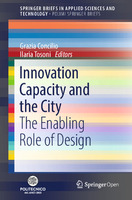Innovation Capacity and the City
The Enabling Role of Design
Contributor(s)
Concilio, Grazia (editor)
Tosoni, Ilaria (editor)
Language
EnglishAbstract
This open access book represents one of the key milestones of DESIGNSCAPES, an H2020 CSA (Coordination and Support Action) research project funded by the European Commission under the Call “User-driven innovation: value creation through design-enabled innovation”. The book demonstrates that adopting design allows us to embed innovation within the city so as to arrive at feasible answers to complex global challenges. In this way, innovation can become disruptive, while also sparking a dynamic of gradual change in the “urbanscape” it acts within. To explore this potential, the book puts forward the concept of “design enabled innovation in urban environments” and examines the part that the city can play in promoting and facilitating the adoption of design among public and private sector innovators. This leads to a potential evaluation framework in which a given urbanscape is assessed both in terms of its capacity for generating innovation, and of the nature (more or less design-dependent or design-prone) of the innovative initiatives it hosts. This thread of reasoning holds many promising implications, including a possible “third way” between those who dream of an alternative economic model where revenues and growth are sacrificed on the altar of social and environmental respect, and the supporters of the traditional market-based view, who feel it is enough to add a touch of responsibility and concern to a system that should continue rewarding the profitability of innovations.
Keywords
Geography; Urban geography; Sociology, Urban; Urban economicsDOI
10.1007/978-3-030-00123-0Publisher
Springer NaturePublisher website
https://www.springernature.com/gp/products/booksPublication date and place
Cham, 2019Series
SpringerBriefs in Applied Sciences and Technology,Classification
Sociology
Regional / urban economics
Urban and municipal planning and policy


 Download
Download Web Shop
Web Shop